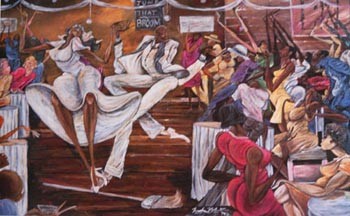Superstitions tend to be along the line of, "If something is done, then something else will happen." For instance, if I break a mirror, I will have seven years of bad luck. I guess this is true for the most part, but some superstitions are just rituals, customs, or something traditional that generations to follow will continue to carry on. An example of this is the
Haka, the Maori dance that originated in New Zealand.
Alan Armstrong, author of
Maori Games and Haka, defines the Haka as:
"A composition played by many instruments. Hands, feet, legs, body, voice,tongue, and eyes all play their part in blending together to convey in their fullness the challenge, welcome, exultation, defiance or contempt of the words.
In football, it is not uncommon to see the team come together before the game, huddle around each other, and hype themselves up to prepare for a big game. The University of Hawaii took this tradition to a whole new level. In keeping with the Polynesian sprite, the Warriors began preforming the
Ka Mata, the Maori war chant. "[Maori] Warriors used the Ka Mate to
prepare for a battle. To focus their strength. To proclaim their powers, To celebrate the triumph of life over death, but mostly to challenge and intimidate the opponent."
Being that college football can be "war on turf", it was only fitting that Hawaii would use this chant. During the 2006 football season, two UH Warriors, Tala Esera and Leonard Peters wanted to do something memorable for their senior year. According to Steve Uyehara reporting for KGMB, Esera asked his cousin from New Zealand for ideas, and he taught them this Haka that was orginally written for New Zealand's Rugby team.
During the Ka Mata, the leader will try to hype up the member by yelling a series of commands. He will tell the members to "Slap the hands against the thighs!Puff out the chest!Bend the knees!Let the hip follow!Stamp the feet as hard as you can!" Next, the leader and members will recite these words: "
Leader: Ringa pakia! Uma tiraha! Turi whatia! Hope whai ake! Waewae takahia kia kino!
Leader: Ka mate, ka mateTeam: Ka ora, ka oraLeader: Ka mate, ka mateTeam: Ka ora, ka ora
All together :Tēnei te tangata pūhuruhuruNāna nei i tiki mai whakawhiti te rāĀ upane, ka upaneĀ upane, ka upaneWhiti te rā, hī!
Translation:
Leader: ’Tis death, ‘tis death (or: I may die) Team: ’Tis life, ‘tis life (or: I may live) Leader: ’Tis death, ‘tis death Team: ’Tis life, ‘tis life All together :This the hairy man that stands here……who brought the sun and caused it to shine. A step upward, another step upward. A step upward, another step upward. The sun shines! It is death, it is death: it is life, it is life; this is the man who enabled me to live as I climb up step by step toward sunlight."
The story has it that a Maori chief fled from an angrey neighboring tribe and hid in a kumara (sweet potatoe) pit. When the rivial tribe came looking for the cheif, a woman from an allied tribe sat over the pit. "In
Maori legend, female sexuality is very potient..." The
hairy man mentioned is said to be in reference to the cheif of the allied tribe, and others say it is a tribute to the woman who exposed her pubic hair over the pit.
As I mentioned earlier, this is not really a superstition, but more of a ritual. The All Blacks Rugby team believes that don't think so. Since Wayne "Buck" Shelford got the All Blacks to preform the war dance the way it was intended to be preformed in 1985, his team was unstoppable in the '87 Inaugural Rugby World Cup! Check out this comercial which shows how the Ka Mata transforms the All Blacks Rugby team into Maori warriors!
 "About 46 million turkeys will be eaten on Thanksgiving Day," said Sherrie Rosen Blatt, spokeswoman for the National Turkey Federation(Fredrix).
"About 46 million turkeys will be eaten on Thanksgiving Day," said Sherrie Rosen Blatt, spokeswoman for the National Turkey Federation(Fredrix).







